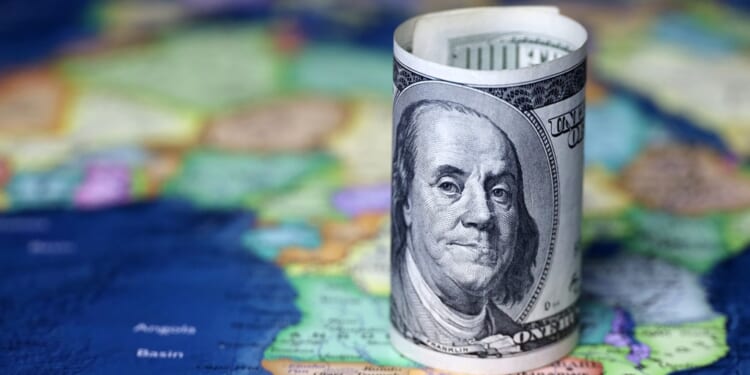Washington is redefining its Africa strategy—prioritizing commercial partnerships, critical minerals, and peace through trade to counter China’s influence.
The United States’ emerging strategy in Africa reflects a new, competitive approach shaped under the Trump administration. Unlike previous aid-heavy policies, it seeks mutually beneficial, commercially driven partnerships built around private-sector integration and interest-based peace deals. As senior advisor for Arab and African Affairs, Massad Boulos said at the African Union in September, Africa is not a charity case; instead, “[President Donald] Trump is focused on economic engagement that empowers local enterprise and opens the door for American companies to compete fairly. This is about building real prosperity, not dependence.”
Competing with China’s Model
This deal-making diplomacy marks a departure from earlier administrations and serves as a counterweight to China’s Belt and Road Initiative (BRI). For years, the BRI has channelled massive investment into Africa, tightening China’s hold over global energy and critical mineral supply chains. Meanwhile, the United States contributed relatively little. Even President Joe Biden made only one late-term visit to the continent. Washington’s focus had long remained on humanitarian aid and risk-averse investment. Beijing’s model, by contrast, is transactional but extractive—prioritising access to raw minerals, infrastructure loans, and asset purchases that leave African countries mired in debt-trap diplomacy and reduced resource sovereignty.
Until recently, the United States offered no coherent alternative. But under Trump’s transactional diplomacy, Washington has adopted an interest-driven approach that promotes secure supply chains for both energy and critical minerals, while avoiding neo-colonial extractivism. Recent statements by President Trump, including his warning to Nigeria over attacks on Christians, underscore that his administration’s foreign policy is increasingly linking trade and investment to values-based engagement and regional accountability. The goal is to create market-driven, entrepreneurial ecosystems that build African capacity and align with the African Union’s Agenda 2063 for inclusive growth and self-reliance.
Peace and Prosperity Through Commerce
African development depends on reliable, long-term investment that establishes integrated value chains, supports regional trade, and strengthens sovereignty. Through its transactional model, the United States is pursuing mutual benefit across Africa, from Morocco to the Democratic Republic of the Congo (DRC) to Zambia. Under the Trump administration, Rwanda, the DRC, and the M23 rebel group signed a peace declaration integrating infrastructure for trade. The Lobito Corridor rail line has become operational, and progress is being made toward resolving the Western Sahara dispute. US companies are following this stability: California-based KoBold Metals, for example, expanded its DRC operations after the Trump-brokered peace deal in June and announced seven new exploration projects.
Last month, the US Chamber of Commerce released Strategic Ground, a white paper outlining how American prosperity and security are strengthened through US–Africa critical-mineral and energy partnerships. As Wayne Wall, Special Assistant to the President, noted: “The US sees Africa not as a dependency, but as an equal partner in progress. Today, we focus on economic prosperity and tangible advancement.” This business-first strategy aligns with Africa’s rollout of the African Continental Free Trade Area (AfCFTA), designed to drive continental industrialisation and trade integration.
Critical Minerals: Africa’s Strategic Leverage
Africa holds roughly 30 percent of the world’s critical minerals—including over 70 percent of global cobalt from the DRC and 70 percent of phosphate from Morocco—and vast renewable energy potential. Yet the so-called “resource curse” has often hindered development as autocratic elites captured revenues and foreign firms colluded in opaque deals. Chinese investment perpetuated these patterns through contracts that stripped African ownership. In contrast, US companies, backed by the US Development Finance Corporation and similar agencies, are encouraged to uphold transparency, labour protections, and reinvestment standards that support local development.
The progress around the operationalization of the Lobito Corridor exemplifies how a coordinated US–Africa energy and minerals strategy can reinforce stability. Massad Boulos, as President Trump’s envoy, has been central to this vision, meeting leaders from Nigeria, the DRC, Morocco, and Rwanda to promote foundational partnerships for sustainable growth. This is part and parcel of his pushing forward with the President’s vision, according to which trade and business—not aid—drive long-term prosperity. This approach represents a broader doctrine of commercial statecraft: leveraging private enterprise to strengthen peace, governance, and infrastructure.
Redefining US Influence
In essence, the new US–Africa strategy embodies pragmatic peace through commerce—a realist framework linking economic growth to stability. As Massad Boulos remarked, the Regional Economic Integration Framework “will reinforce peace and benefit millions across the Great Lakes region, helping communities build a stake in lasting stability and shared prosperity.” Likewise, durable peace in central Africa cultivates the foundation for new opportunities in commerce and cross-border trade. Many observers have noted that the loss of the US Agency for International Development (USAID) marks an end to US-led development, yet President Trump’s US-Africa strategy is set to transform development, not eliminate it. When Boulos met with African leaders at the US-Africa Business Summit in Angola, he said, “The Lobito Corridor is the flagship example of what peace and partnership can deliver.” Rehabilitating the Benguela Railway and helping to remove landmines shows how interest-driven development is ongoing and growing, set to reshape African economies for years to come.
The administration seeks to resolve Africa’s conflicts through economic empowerment, turning growth into a catalyst for peace. Challenges remain—the DRC-Rwanda peace deal has seen violations, and parts of the Lobito Corridor remain insecure—but investment across Africa is creating jobs, modernising infrastructure, and advancing Agenda 2063. The US model, grounded in deal-making and partnership, offers a clear alternative to China’s state-led monopolies. While America’s financing mechanisms move more slowly, Trump’s transactional diplomacy promises a faster, mutually beneficial pathway to stability—anchored in both critical minerals and energy. Ultimately, this strategy is not just about resources; it aims to redefine US influence in a multipolar era, rooted in commerce, cooperation, and shared prosperity.
About the Author: Asher Pascal Johnson
Asher Pascal Johnson holds a BA in Classics and Political Science from Lee University and an MA in Ancient Philosophy through the National University of Athens. He is currently at the Johns Hopkins School of Advanced International Studies in Italy and is an avid researcher and political consultant, specializing in MENA region political and economic analysis. He also works on topics in economic ethics and moral philosophy, with a particular interest in economic nationalism.
Image: Oleg Elkov/shutterstock


















